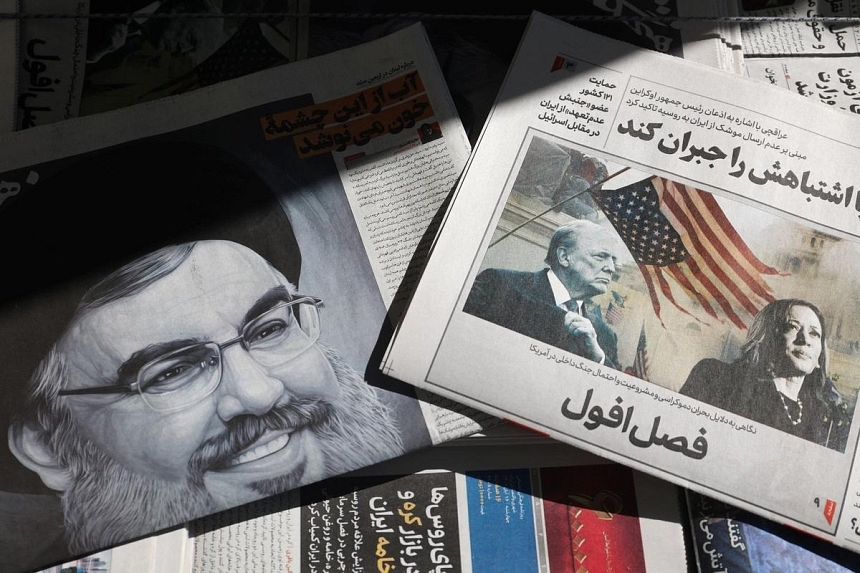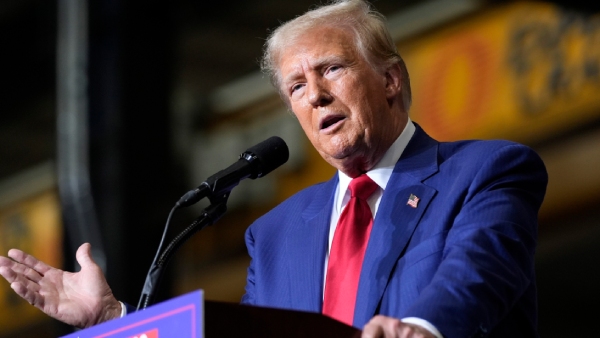Donald Trump victory in the 2024 U.S. presidential election has generated a range of responses in Iran, with ordinary citizens divided on whether his return to power would benefit the country.
Some Iranians view Trump victory hardline policies as an opportunity for change, hoping his “maximum pressure” strategy will ultimately destabilize the Islamic Republic and lead to a regime collapse. Others, however, fear that his tough stance could worsen economic conditions, heighten the risk of war, and exacerbate already dire political tensions.
In Tehran, Zohre, a 42-year-old housewife, voiced her approval of Trump’s victory, expressing hope that his aggressive policies would continue. “I am so glad Trump won. I hope he continues his maximum pressure on the Islamic Republic, and that it leads to the collapse of this regime,” she told Reuters by phone. For her, Trump’s approach represents a necessary challenge to the Iranian government, which she views as oppressive.
Contrasting with Zohre’s enthusiasm, Hamidreza, a 66-year-old retired teacher from Rasht, expressed deep concern about the potential consequences of Trump’s re-election. “I am disappointed Trump won. It means more economic pressure, the risk of a war with Israel. I am deeply concerned,” he said. Like many Iranians who have lived through the painful effects of U.S. sanctions, Hamidreza worries that Trump’s policies will exacerbate the already struggling Iranian economy and push the country closer to conflict with its regional adversaries, particularly Israel.
Meanwhile, Nader, a 34-year-old government employee from Ahvaz, takes a more pragmatic stance. “I don’t care who the U.S. president is. My main concern is Iran’s economy. If they lift sanctions on Iran, that would be a good thing,” he stated. For Nader, the political dynamics in the United States are secondary to the economic hardships that Iranians continue to face as a result of prolonged sanctions. While not particularly invested in the election outcome, Nader hopes for an easing of sanctions that would provide relief to the Iranian people.

The Straits Times
On the other end of the spectrum, Parastou, a 21-year-old student from Tehran, expressed optimism about the Trump victory. “Everyone is happy, and I am thrilled. Trump is a no-nonsense leader who will put pressure on the clerical rulers. This is good for the Iranian people who seek a democratic leadership,” she said. Like Zohre, Parastou sees Trump’s hardline policies as a means of applying pressure to the Iranian government, hoping that the fallout will eventually lead to more political freedom and reform within the country.
These mixed reactions reflect the complex and volatile nature of Iranian political sentiment. The personal and ideological stakes of the U.S. presidential election are immense for many Iranians, whose lives and futures are directly affected by the policies of the U.S. government. Publicly, the Iranian political leadership has downplayed the significance of the U.S. election results, maintaining that Tehran’s policies will not change regardless of who occupies the White House. However, the election outcome is nonetheless a source of anxiety for Iran’s political elite, who fear the return of Trump could embolden Israeli Prime Minister Benjamin Netanyahu and his hardline approach toward Iran.
Iran’s leadership remains deeply concerned about the possibility of an Israeli military strike on its nuclear facilities, which could escalate into a full-scale regional conflict. There is also apprehension that Trump could intensify sanctions on Iran’s oil industry and implement further measures aimed at destabilizing the Iranian government. According to insiders, Trump’s return to the White House could encourage a policy of increased pressure on Tehran, particularly as the president has shown little inclination to compromise on key issues such as Iran’s nuclear program and its regional influence.
However, there are some who believe that Trump, known for his transactional approach to politics, may be cautious about initiating full-scale conflict with Iran. Reza Mohammadi, a member of Iran’s volunteer Basij militia from Isfahan, pointed out that Trump, being a businessman, is aware of the significant risks involved in escalating hostilities with Iran. “Trump is a businessman. He knows Iran is powerful and can turn the Middle East to hell if attacked. He wants to end wars in the region, not fuel it,” Mohammadi said. This perspective suggests that while Trump’s rhetoric may be belligerent, his pragmatic nature may push him toward more cautious diplomacy, avoiding a direct military confrontation with Iran.

Trump’s policy on Iran has been characterized by “maximum pressure” since his first term in office (2017-2021), which saw the United States pull out of the 2015 nuclear deal with Iran, formally known as the Joint Comprehensive Plan of Action (JCPOA). The Trump administration reimposed harsh sanctions on Iran, targeting key sectors of the economy, including oil, banking, and shipping. These sanctions were designed to cripple the Iranian economy and force the regime to renegotiate its nuclear program. In response, Tehran began violating the nuclear deal’s terms, increasing its stockpile of enriched uranium and installing advanced centrifuges to accelerate its nuclear program.
The efforts to revive the JCPOA during the Biden administration have faltered, leaving the nuclear deal in a state of uncertainty. In a campaign speech in September, Trump remarked that “We have to make a deal, because the consequences are impossible. We have to make a deal,” signaling that, despite his tough stance, he recognized the potential for diplomacy with Iran. This statement echoed his previous remarks during his first term, when he emphasized the need for a new deal that would address both Iran’s nuclear activities and its broader influence in the region.
The nuclear issue remains a major point of contention between the United States and Iran, and Trump’s return to office could force Iranian Supreme Leader Ayatollah Ali Khamenei to reconsider his position on negotiations. According to two anonymous Iranian officials, Trump’s aggressive approach could push Khamenei into a position where he might agree to talks with the United States, whether direct or indirect. Such negotiations would likely focus on Iran’s nuclear program, but could also involve broader discussions on regional security and stability.
Despite the ongoing tensions between the U.S. and Iran, some analysts believe there is still the possibility for a détente between the two countries, even without the formal restoration of diplomatic ties. Saeed Laylaz, a Tehran-based analyst, suggested that secret negotiations could take place behind the scenes, as Iran is motivated by its own strategic interests to reduce the risks of war and stabilize its economy. “Iran will act based on its own interests. It is possible that secret talks between Tehran and Washington take place. If security threats against the Islamic Republic are removed, anything is possible,” Laylaz said.
However, even with these diplomatic openings, Iran remains focused on its strategic and military rivalry with Israel, especially as tensions have escalated in the broader Middle East. Israel, which views Iran as an existential threat due to its nuclear program and support for militant groups in Gaza and Lebanon, has been engaged in a series of military confrontations with Iranian-backed forces in the region. On October 1, Iran launched a missile attack on Israel, which prompted Israeli airstrikes on Iranian military targets, including missile production sites, on October 26.
Trump, who has expressed support for Israel in its conflict with Iran, has stated that he would prefer to avoid a direct war with Iran. However, he has also urged Israel to act decisively in preventing Iran from acquiring nuclear weapons. In a speech in October, Trump stated that he believed Israel should “hit the Iranian nuclear first and worry about the rest later.” This statement reflects his longstanding view that Iran’s nuclear ambitions must be halted at all costs, even if it means supporting Israeli military action.
Despite the rhetoric and potential for military escalation, Trump’s victory has also sparked concerns in Iran about the broader implications for the Middle East. Iranian leaders worry that Trump will prioritize Israel’s security over regional stability, exacerbating tensions and increasing the likelihood of conflict. The reimposition of sanctions and the risk of military strikes could further destabilize the region, especially as Israel continues its efforts to neutralize Iranian influence in neighboring countries.

Ultimately, Trump’s re-election has left Iranians grappling with the uncertainty of what lies ahead. While some welcome his aggressive policies as a way to weaken the Islamic Republic, others fear that it could lead to even greater economic hardship and geopolitical instability. The debate over Trump’s impact on Iran’s future is likely to persist as the new administration shapes its policies toward the Middle East. As Iran’s leaders navigate the complex and volatile geopolitical landscape, they will be forced to respond to Trump’s hardline stance while balancing their own national interests and the security of the Islamic Republic.
In conclusion, the aftermath of Trump’s victory in the 2024 U.S. presidential election has created significant anxiety and hope among ordinary Iranians. While some see his tough approach as a way to challenge the Iranian government, others fear that it will only exacerbate existing tensions and economic woes. The potential for conflict with Israel, coupled with the ongoing nuclear standoff, suggests that Trump’s policies could have far-reaching consequences for both Iran and the wider Middle East. However, as both sides continue to assess the risks and opportunities, the future of U.S.-Iran relations remains uncertain, leaving many in Iran anxious about what Trump’s victory will mean for the country’s future.




